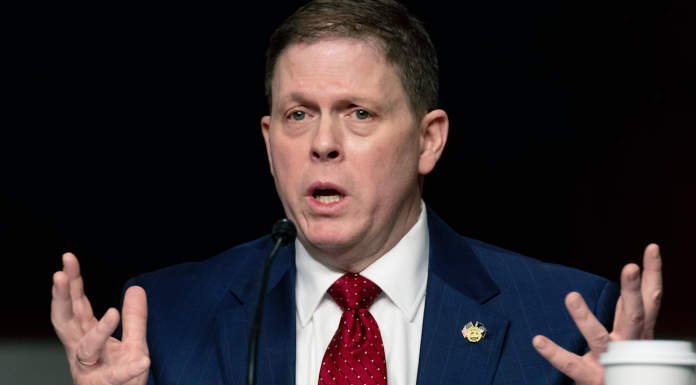(Headline USA) Testifying for the first time about the siege at the U.S. Capitol, former security officials blamed faulty intelligence for the failure to anticipate the violent intentions of the mob that invaded the building and interrupted the certification of the presidential election.
The officials, including the former chief of the Capitol Police, are blaming other federal agencies — and each other — for their failure to defend the building as a smattering of supporters of then-President Donald Trump blended with Antifa agitators overwhelmed security barriers, breaking windows and doors and sending lawmakers fleeing from the House and Senate chambers. They say they expected the protests to be similar to two pro-Trump events in late 2020 that were far less violent.
Former Capitol Police Chief Steven Sund described a scene that was “like nothing” he had seen in his 30 years of policing.
“When the group arrived at the perimeter, they did not act like any group of protestors I had ever seen,” the ousted chief said, arguing that the siege was not the result of poor planning but of failures across the board from many agencies and officials.
The FBI has uncovered evidence and reported that the movement on the Capitol was pre-planned and not part of an incitement by Trump’s speech on Jan. 6, contrary to false mainstream media reporting and allegations by many members of Congress.
“No single civilian law enforcement agency – and certainly not the USCP – is trained and equipped to repel, without significant military or other law enforcement assistance, an insurrection of thousands of armed, violent, and coordinated individuals focused on breaching a building at all costs,” Sund said.
The joint hearing, part of an investigation of Jan. 6 by the Senate Homeland Security and Governmental Affairs Committee and the Senate Rules Committee, is the first time the officials have testified publicly about the events of that day.
In addition to Sund, former Senate Sergeant-at-Arms Michael Stenger, former House Sergeant-at-Arms Paul Irving and Robert Contee, the acting chief of police for the Metropolitan Police Department, are testifying.
Sund, Irving and Stenger resigned under pressure immediately after the deadly attack.
“We must have the facts, and the answers are in this room,” Senate Rules Committee Chairwoman Amy Klobuchar said at the beginning of the hearing.
Sund told the lawmakers that he learned only after the attack that his officers had received a report from the FBI’s field office in Norfolk, Virginia, that forecast, in detail, the chances that extremists could commit “war” in Washington the following day. The head of the FBI’s office in Washington has said that once he received the Jan. 5 warning, the information was quickly shared with other law enforcement agencies through the joint terrorism task force.
Sund said Tuesday that an officer on the task force had received that memo and forwarded it to a sergeant working on intelligence for the Capitol Police but that the information was not put forward to any other supervisors. Sund said he wasn’t aware of it.
Senate Homeland Chairman Gary Peters, D-Mich., said the failure of the intelligence report to reach the chief was clearly a major problem.
“How could you not get that vital intelligence?” he asked.
“That information would have been helpful,” Sund replied.
The officials have also disagreed on when the National Guard was called and on requests for the guard beforehand. Sund said he spoke to both Stenger and Irving about requesting the National Guard in the days before the riot, and that Irving said he was concerned about the “optics” of having them present.
Irving denied that, saying Sund’s account is “categorically false.” Safety, not optics, determined their security posture, he said, and the top question was whether intelligence supported the decision.
“We all agreed the intelligence did not support the troops and collectively decided to let it go,” Stenger said.
He added that they were satisfied at the time that there was a “robust” plan to protect Congress.
Tuesday’s hearing is the first of at least two public examinations of what went wrong that day as the Senate panels undertake a joint investigation into the security failures. A second hearing, expected to be held in the next few weeks, will examine the response of the Defense Department, the Department of Homeland Security and the FBI.
Adapted from reporting by Associated Press.

